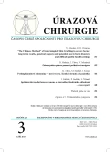Peri-implant fractures - new chalenge. Short review and case history
Authors:
Kristián Chrz; Martin Sedlář; Josef Kraus
Authors‘ workplace:
1. surgical department of General University Hospital in Prague
; 1. chirurgická klinika VFN a 1LF UK
Published in:
Úraz chir. 23., 2015, č.3
Overview
Objective:
The goal of this retrospective study is to discuss a relatively new group of fractures, which appeared in relation to progress and results of modern musculoskeletal traumatology, and to contribute to their ma-nagement based on the literature and our own expe-riences.
Materials and method:
The authors summarize the results of rare literary references about this fracture type and present their own experience. There were 26 patients with peri-implant fractures treated at a Ge-neral university hospital in Prague between 2009 and 2014. All patients were treated surgically. They demonstrate in 5 cases-reports some treatment possibilities.
Results:
In accordance with the literature, the surgical treatment option has been chosen in all patients. The following techniques were used: bridging poly-axial plate; implant removal and fracture stabilization with an appropriate nail; nailing through the original endo-prosthesis, removal of the original implant and replacement with a longer variant.
As complications we noted: 2x superficial infection,x malposition (1x) and 1x deep venous thrombosis with successive pulmonary embolization. Other complication described in literature (deep wound infection or non-union) did not appear in our series.
Conclusion:
Peri-implant and peri-prosthetic fractures are a relatively new problems in traumatology. Treatment of this fracture type frequently requires new procedures and the use of sophisticated implants on high technological level.
Key words:
Peri-implant fractures, periprosthetic fractures, operative treatment, new implants.
Sources
1. FERNANDEZ-FERNANDERZ, R., GARCIA-ELIAS, E., GIL-GARAY, E. Pero-perative fractures in uncemented total hip arthroplasty: results with a single design of stem implant. International Orthopaedics. 2008, 32, 307–313.
2. FOUSEK, J., VAŠEK, P. Dlahová osteosyntéza u periprotetických zlomenin typu Vancouver B1 a B2. Acta Chir Orthop Traumatolog Čech. 2009, 76, 410–416.
3. GOHAR, AN., SHAKOOR, AB., NASIR, A. Interobserver and Intraobser-ver Reliability and Validity of the Vancouver Classification System of Periprosthetic Femoral Fractures After Hip Arthroplasty. J Arthroplasty. 2012, 27, 1047–1050.
4. HOLLEY, K., ZELKEN, J., PADGETT, D. et al. Periprosthetic fractures of the femur after hip arthroplasty: an anylysis od 99 patients. HSS Journal. 2007, 10, 190–197.
5. HSIEH, PH., CHANG, YH., LEE, PC. et al. Periprosthetic fractures of the greater trochanter through osteolytic cysts with uncemented MicroStructured Omnifit prosthesis: retrospective analyses of 23 fractures in 887 hips after 5–14 years. Orthop. 2005, 76, 538–543.
6. JOHANSSON, JE., MCBOOM, R., BARRINGTON, TW. et al. Fracture of the ipsilateral femur in patients wih total hip replacement. J Bone Joint Surg. 1981, 63, 1435–1442.
7. KAIN, MS., MARCANTONIO, AJ., LORIO, R. Revision surgery occurs frequently after percutaneous fixation of stable femoral neck fractures in elderly patients. Clin Orthop. 2014, 472, 4010–4014.
8. LENA, T., DŽUPA, V., LUŃÁČEK, L. et al. Peroperační periprotetické zlomeniny u TEP kyčelního kloubu v letech 1995–2009. Acta Chir Orthop Traumatolog Čech. 2013, 80, 341–345.
9. MARSLAND, D., MEARS, SC. A review of periprosthetic femoral fractures associated with total hip arthroplasty. G Orthop Surg. 2012, 3, 107–120.
10. MCELFRESH, EC., COVENTRY, MB. Femoral and pelvic fractures after total hip arthroplasty. J Bone Joint Surg. 1974, 56, 483–492.
11. PARK, SK., KIM., YG., KIM, SY. Treatment of periprosthetic femoral fractures in hip arthroplasty. Clin Orthop Surg. 2011, 3, 101–106.
12. POKORNÝ, V. Traumatologie. Praha: Triton, 2002. 307 s. ISBN 80–7254–227–X.
13. POP, TS., GERGELY, I., ROMAN, C. et al. Periprosthetic femoral fractures after total hip arthroplasty. ASORIS. 2011, 4, 53–60.
14. RAYAN, F., HADDAD, F. Periprosthetic femoral fractures in total hip arthroplasty - a review. Hip Int. 2010, 20, 418–426.
15. SCHWARZKOPF, R., ONI, JK., MARWIN, SE. Total hip arthroplasty periprosthetic femoral fractures - A Review of Classification and Current Treatment. Bulletin of the Hospital for Joint Diseases. 2013, 71, 68–78.
16. TAKAHIRO, N., SANG, YL., YOSHITADA, S. et al. Treatment Results of a Periprosthetic Femoral Fracture Case Series: Treatment Method for Vancouver Type B2 Fractures Can Be Customized. Clin Orthop Surg. 2014, 6, 138–145.
17. THIEN, TM. Periprosthetic femoral fracture within two years after total Hhp replacement. J Bone Joint Surg. 2014, 96, 167.
18. TOMÁŠ, T., NACHTNEBL, L., OTIEPKA, P. Periprotetická zlomenina distálního femuru - klasifikace a terapie. Acta Chir Orthop Traumatolog Čech. 2010, 77, 194–202.
19. ZUCKERMAN, JD. Comprehensive Care of Orthopedic Injuries in the Elderly. Hardcover : Urban & Schwarzenberg. 1990, 699, ISBN 978–0806722412.
20. WANG, JQ., GAO, YS., MEI, J. et al. Revision hip arthroplasty as a treatment of Vancouver B3 periprosthetic femoral fractures without bone grafting. Indian Journal of Orthopaedics. 2013, 47, 449–453.
Labels
Surgery Traumatology Trauma surgeryArticle was published in
Trauma Surgery

2015 Issue 3
- Possibilities of Using Metamizole in the Treatment of Acute Primary Headaches
- Metamizole at a Glance and in Practice – Effective Non-Opioid Analgesic for All Ages
- Metamizole vs. Tramadol in Postoperative Analgesia
- Spasmolytic Effect of Metamizole
- Metamizole in perioperative treatment in children under 14 years – results of a questionnaire survey from practice
-
All articles in this issue
- Pelvic Osteosynthesis using computer guided navigation
- Peri-implant fractures - new chalenge. Short review and case history
- Ipsilateral posterior shoulder dislocation and sternoclavicular dislocation – case report
- “The Chinese Method” of Intermingled Skin Grafting in severe burns: long term results, genetical aspects and potential use in burn disasters and difficult public health settings
- Trauma Surgery
- Journal archive
- Current issue
- About the journal
Most read in this issue
- Ipsilateral posterior shoulder dislocation and sternoclavicular dislocation – case report
- Peri-implant fractures - new chalenge. Short review and case history
- Pelvic Osteosynthesis using computer guided navigation
- “The Chinese Method” of Intermingled Skin Grafting in severe burns: long term results, genetical aspects and potential use in burn disasters and difficult public health settings
